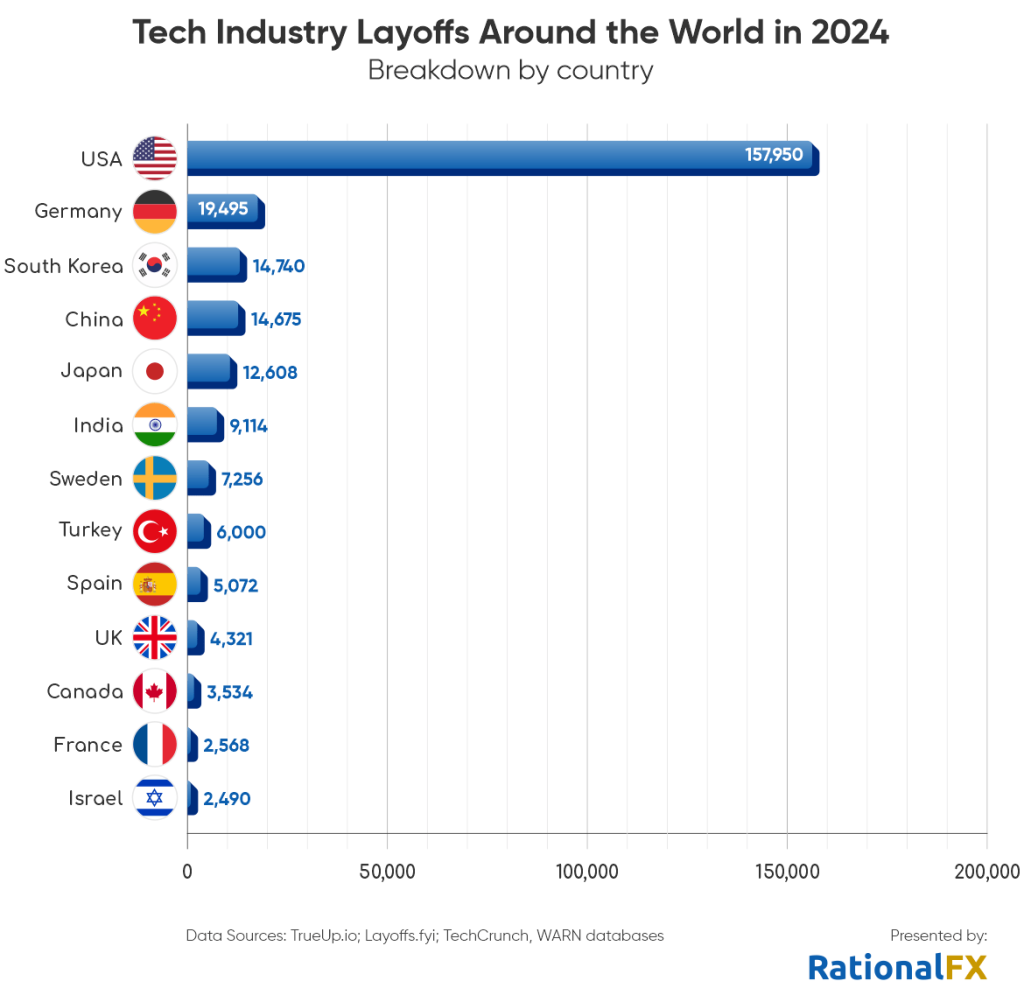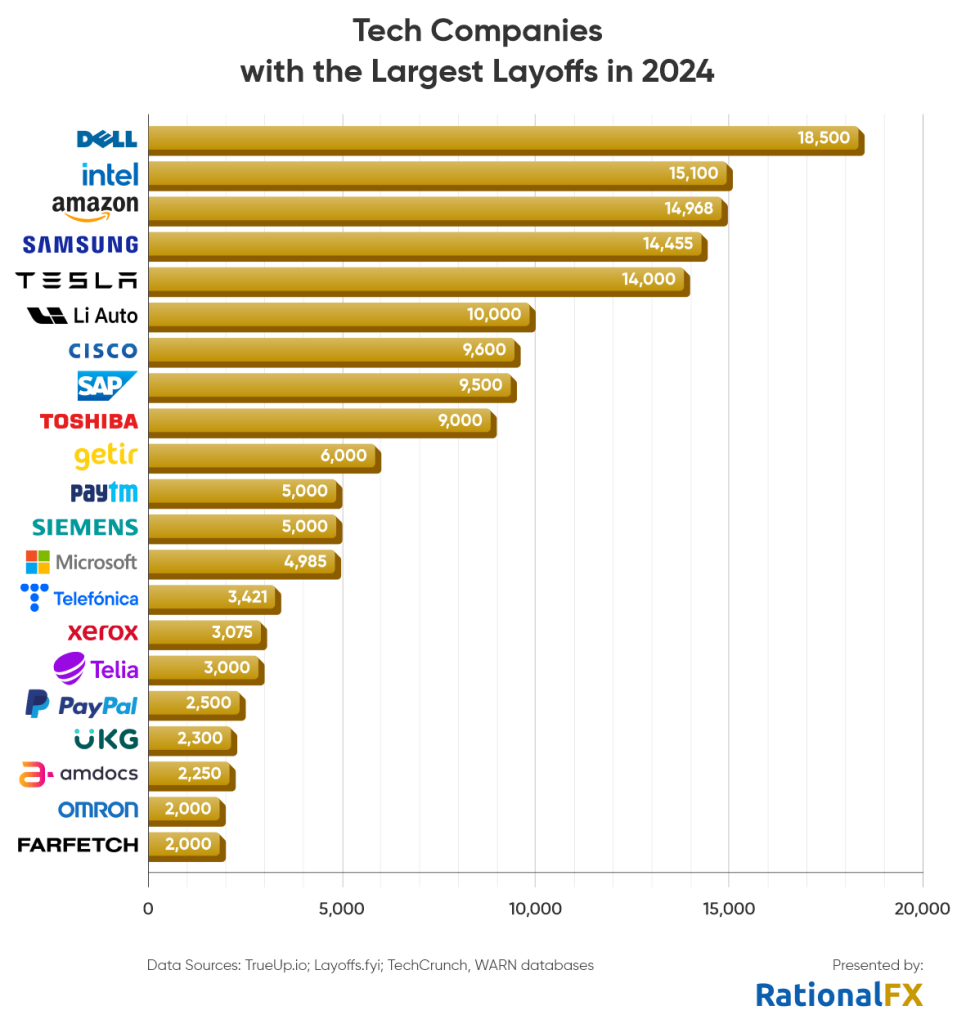Physical Address
60 Ekwema Cres, Layout 460281, Imo
Physical Address
60 Ekwema Cres, Layout 460281, Imo

The global tech industry records 181,457 layoffs so far in 2025, and this number is expected to rise to 235,000 by the end of the year. This information comes from a report by RationalFX, a site that helps people learn about money and trading. The report looked at job cuts between January 1 and October 9, 2025.
The big reason for these layoffs is that technology is changing fast. More companies are using artificial intelligence (AI) and automation to do work that people used to do. Because of this, many jobs are disappearing completely, not just a few people losing their jobs. This means entire roles are going away as companies change how they work.
Read Next: Uber’s Service Quality Declines in South Africa as Passenger Complaints Increases
At the start of October alone, around 1,400 tech jobs were cut. This shows how fast companies are trying to save money and make their businesses leaner. The report gathered information from places like TrueUp and TechCrunch, as well as official government lists, to get a clear picture.

Most of these layoffs — 120,569 to be exact, or about two-thirds — happened in the United States. That makes sense because the U.S. has the biggest tech industry in the world.
Two big American companies, Intel and Microsoft, caused the largest job cuts. Intel laid off about 33,900 workers, while Microsoft cut around 19,215 jobs. Other big names like Amazon, Salesforce, and Meta also made the list of top companies cutting jobs in 2025.
Alan Cohen, an analyst from RationalFX, said that the layoffs come partly because of trade problems between the U.S. and China. These problems make companies spend less and cut jobs to save money. Other issues, like government shutdowns and less buying from customers around the world, also hurt the tech industry.
Cohen explained that “tech industry layoffs in 2025 have displaced tens of thousands of workers as companies face growing economic and political challenges. At the same time, the push toward AI and automation is speeding up these job cuts.”
Experts predicted that as smart machines get better, fewer people will be needed to do tech jobs. This means companies will shrink their staffs and use more machines and software.
Looking at other countries, India has seen nearly 18,000 layoffs this year, also because it is a key tech center. Japan is third, with over 11,000 layoffs, mostly due to Panasonic cutting 10,000 jobs, which is about 4% of its workforce.
Switzerland and Sweden are fourth and fifth on the list, with more than 5,000 and 3,000 layoffs, respectively. Switzerland’s cuts include 3,000 jobs lost at STMicroelectronics, a big chipmaker. Countries like Canada, the UK, Indonesia, Israel, and Germany have also seen thousands of tech jobs disappear.
Among companies, Intel leads worldwide with almost 33,900 layoffs. Intel plans to cut about 25 to 30 percent of its workers by the end of 2025. Microsoft is focusing on AI and cloud computing, which is part of why it laid off many employees.

Indian company Tata Consultancy Services also laid off 12,000 workers this year because demand slowed down and the company needs to adjust to AI and automation. Other big job cutters include Accenture with 11,000 layoffs, Panasonic, IBM, Salesforce, STMicroelectronics, Amazon, and Meta.
Read Next: Kenyan Govt to Launch Online Platform for Selling Farmers’ Produce
Despite all these job cuts, many tech companies are still making good money. Microsoft reported $76.44 billion in revenue for the three months ending June 30, which is 18 percent more than last year. Meta also did well financially, with a 22 percent increase in sales to $47.52 billion in the second quarter, even though it laid off workers.
These companies continue to spend a lot of money on AI and automation to improve how they work and cut costs. Because of this shift, the global tech industry records 181,457 layoffs in 2025, and the number is projected to reach 235,000 by year’s end. More changes like this are expected as tech companies keep adjusting to new technology and economic challenges.
Was this information useful? Drop a nice comment below. You can also check out other useful contents by following us on X/Twitter @siliconafritech, Instagram @Siliconafricatech, or Facebook @SiliconAfrica.